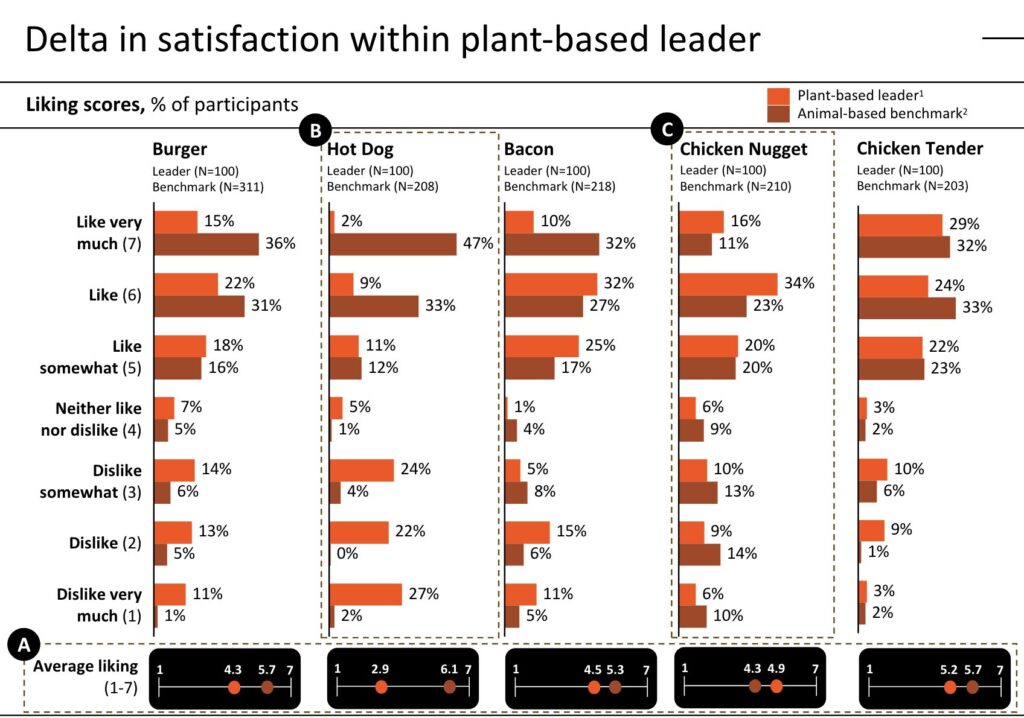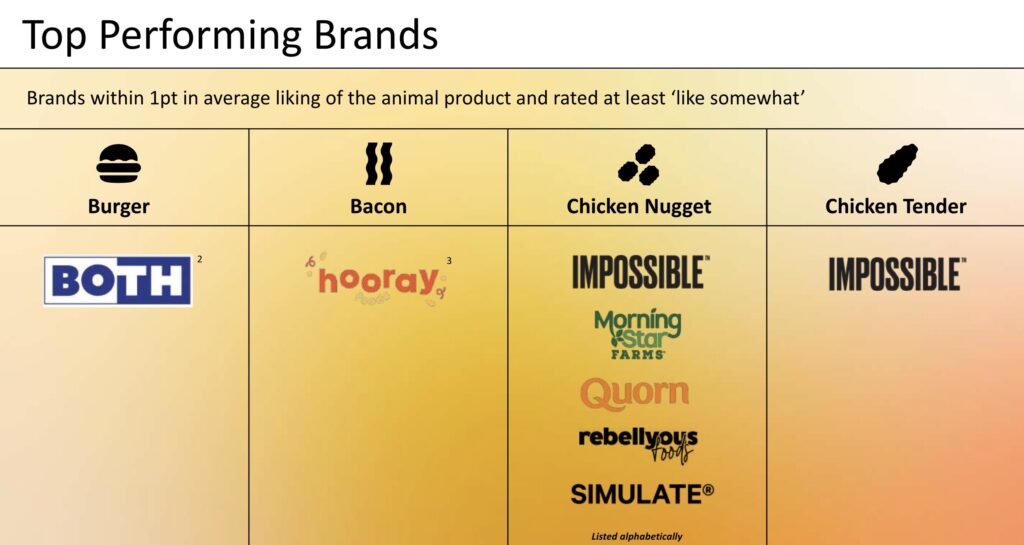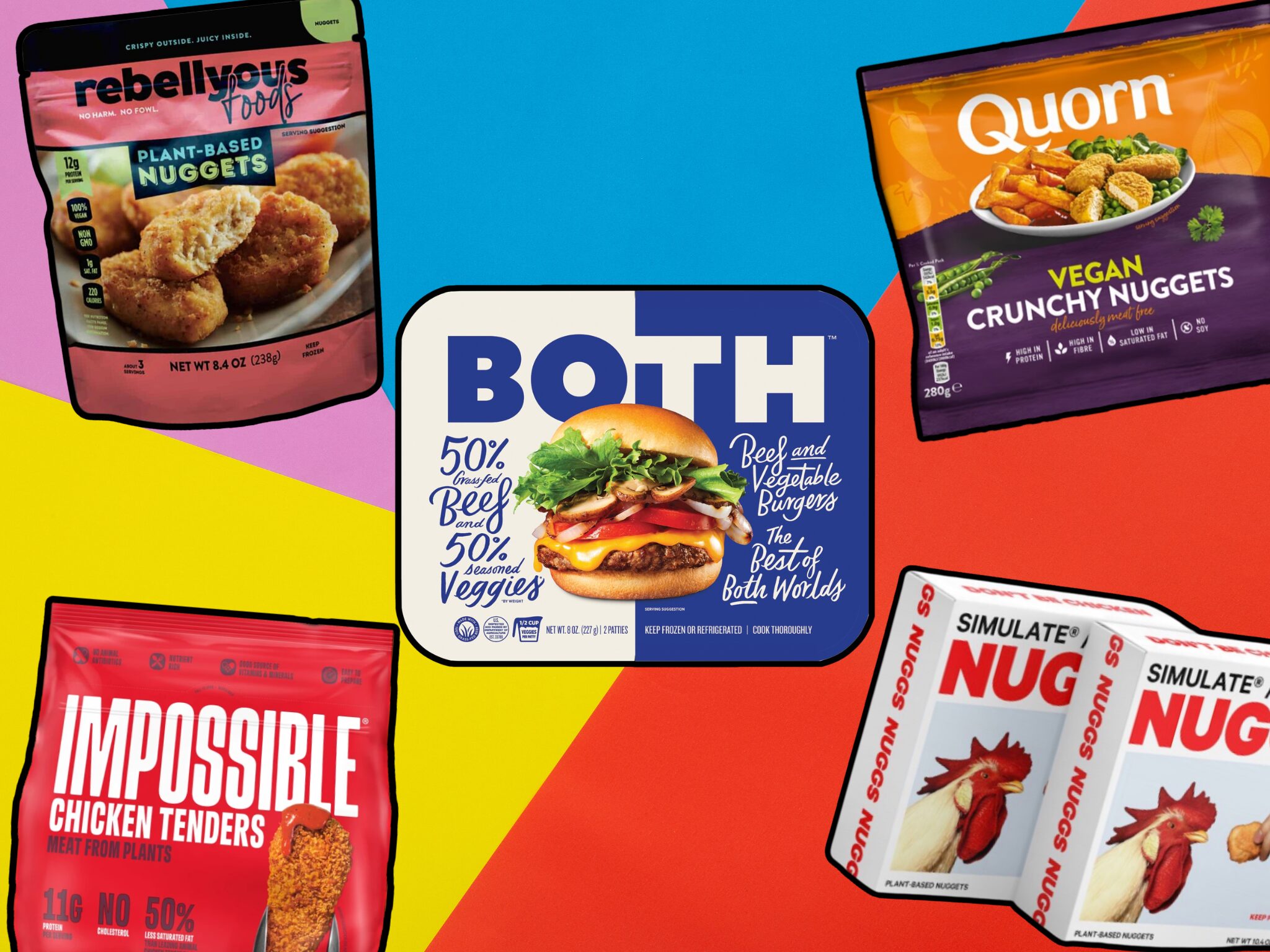Most Plant-Based Products Fall Short of Meat-Eaters’ Taste Expectations, Finds Analysis
8 Mins Read
Most plant-based meats underperform on the taste front for omnivores, and blended meat could be a potential game-changer, detailed sensory analysis has found.
Vegan meat analogues need to be spicier, smokier, sweeter, darker, juicier, and bolder to sway omnivores away from conventional burgers, sausages, bacon and other meat products, according to the results from sensory testing by Nectar, a new initiative focused on taste-based protein transition.
Its inaugural Taste of the Industry report is based on insights from 1,150 American meat-eaters who participated in sensory panels evaluating 15 taste attributes for 54 plant-based meat products across five categories between June and August last year.
These were burgers, hot dogs, bacon, chicken tenders, and chicken nuggets, and Nectar found that, while some leading plant-based products are ready for mainstream adoption, most brands fell short.
Each product was tested against an animal-based benchmark – and nuggets were the only category where plant-based versions outperformed their conventional counterparts. Impossible Foods, MorningStar Farms, Quorn, Rebellyous Foods and Simulate were the top taste performers here.
“By championing great-tasting products, empowering brands and consumers with data-driven insights, and fostering partnerships across the industry, Nectar’s launch heralds a new era of innovation and collaboration in the alternative protein space,” said Max Elder, managing director of non-profit Food Systems Innovation, which established Nectar last month.
The burger opportunity

While burgers are perhaps the most popular plant-based category in terms of the number of options on the market, there’s a big satisfaction gap here. After evaluating nine vegan and blended (a mix of conventional meat and plant-based ingredients) commercially available burgers, the researchers found that 78% of omnivores rated conventional burgers as ‘somewhat like’, ‘like’ or ‘like very much’, versus just 37% for the average plant-based burger.
The leading vegan burger performed slightly better across these metrics (55%), but it was clear that the average plant-based options can improve. “The biggest opportunity for plant-based burger brands is to develop bolder flavour profiles,” says Caroline Cotto, director of Nectar. “The most significant differences in consumer preference between plant-based and animal burgers were in flavour rather than texture or appearance.”
She adds: “Consumers also want plant-based burgers to be ‘meatier’ (spicier, smokier, saltier, sweeter, darker, and juicier), with 45% of participants finding plant-based burgers as not meaty enough. ‘Meatiness’ had a larger impact on overall liking than any other trait.”
Blended meat could be a key pathway to plant-based

One of the most striking findings was the impression of blended meat products. The leading product in this category – 50/50 Foods’ Both burger – outperformed the plant-based leader, and was the only patty that performed within one point in average liking of the conventional burger.
The blended burger made from 50% beef and 50% vegetables was rated as ‘somewhat like’, ‘like’ or ‘like very much’ by 69% of consumers, while the leading vegan patty was liked by 55%. That said, blended products are still closer in liking to plant-based burgers than animal-derived beef patties.
“Omnivores preferred the appearance and flavour of the blended burger. Survey respondents found the best-performing plant-based burger lacked the desired levels of spiciness, smokiness, sweetness, and saltiness compared to the blended burger,” says Cotto. “Taste is a primary purchase driver for all food products. If blended meats can offer better taste profiles for omnivores today, they have a significant role to play in the protein transition.”
She adds that the blended burger’s success has prompted Nectar to initiate “the world’s largest public sensory analysis of blended meats”. Testing around 40 products across eight formats, the research will explore the optimal plant-animal ratio, the best plant-based ingredients, the best channels to promote the category, and potentially better names. It will be out this autumn.
Plant-based nuggets are at parity

Chicken nuggets are the most disliked of all animal products analysed, with more than a quarter of omnivores (27%) disliking the conventional versions. Plant-based products have successfully disrupted this space, with both the average vegan nugget and market leaders performing better than animal-derived nuggets.
While 53% of omnivores liked conventional chicken nuggets, 70% were satisfied with the leading vegan nugget. In fact, 54% liked the average plant-based nugget as well. Flavour is key here, though for product development teams, meatiness and consistency should be top of mind.
“While we can’t reveal the best-performing nugget brand, we can share that the top performers within one point of the animal-based benchmark included Impossible, MorningStar Farms, Quorn, Rebellyous Foods, and Simulate (in alphabetical order),” reveals Cotto.
“These products stood out for their superior flavour, which was most central to overall liking. Generally, breaded and fried plant-based meat categories receive higher ratings than non-breaded and fried categories,” she explains.
“Omnivores appreciate the flavour of plant-based nuggets but see room for improvement in meatiness and consistency. Brands should enhance juiciness [and] saltiness, and address mildness to ensure their products outperform all animal nuggets, not just the benchmark used in the study.”
Hot dogs: a white space for leading brands

There’s a lot of room for improvement for vegan hot dogs, which represent the least-liked plant-based meat category in the Taste of the Industry report. Only 22% of meat-eaters liked the market-leading animal-free hot dog, compared to 55-75% for the rest of the products (chicken tenders were the most liked). In comparison, 92% said they liked conventional hot dogs (and 19% liked the average plant-based offering).
The gap existed across all sensory attributes, representing major opportunities across flavour, texture and appearance. But there is a caveat, according to Cotto. “The hot dog category has evolved significantly since last fall. Brands like Impossible, Oscar Mayer and others have introduced hot dog products that were not part of this study,” she says.
“To emerge as category leaders, brands should aim for bolder flavours (meatier, juicier, sweeter, spicier, smokier) while avoiding overcorrection – being too salty, for example, has a greater negative impact on overall liking than being not salty enough,” adds Cotto.
Meanwhile, vegan bacon could also do with improvements. Although Hooray Foods’ rice- and pea-based version actually came within one point of average liking with animal-derived bacon, the company ceased operations within a month after the taste tests were concluded.
“Plant-based bacon struggles with appearance, consistency, and flavour,” states Cotto. “To surpass animal bacon in taste, brands should focus on enhancing meatiness, making the product less mild, and increasing crispiness. Currently, plant-based bacon is often considered too soft and chewy, while animal bacon is seen as too crispy.”
The health-nutrition disparity

The research further explored omnivores’ broader sentiments about plant-based foods, with 84% agreeing that eating more vegan meals reduces animal farming (only 5% disagreed with this statement). Similarly, 77% believe plant-based products are better for the environment, though 16% are unsure about this – previous research has shown that Americans fail to associate eating meat with climate change.
Health, meanwhile, has been the major buzzword around plant-based meat recently. It’s a factor that has become increasingly important for consumers, and something that has made leading brands change the way they market their products. Based on Nectar’s research, you can see why: while 80% of omnivores believe plant-based products are better for their health, only 55% find them to be more nutritious.
Cotto has an inkling as to why that is (although this hasn’t been tested). “Consumers think about health in terms of [a] holistic diet (i.e. plant-based diet is healthy) and… consumers think about nutrition at a product level,” she says. “Our takeaway from this is that plant-based meat companies should focus on broader health positioning when marketing their products and lean into messaging that shows plant-based products are part of a healthy diet and lifestyle.”
The takeaways for product developers

The report shows how there are several major hurdles for plant-based meat to overcome. “Nectar believes there isn’t a single primary barrier for the plant-based meat category, but rather a variety of market, channel, and consumer needs. We also believe great taste is essential for mainstream adoption of plant-based meats,” says Cotto.
“Our Taste of the Industry 2024 indicates that while the average satisfaction with plant-based meat is low, some leading products perform well, showing the potential for improving taste profiles across the board,” she adds.
The progress being made by companies can already be seen with the example of the hot dogs. Since completing the trial in August, Impossible Foods and Oscar Mayer have both unveiled vegan versions, as Cotto mentions above. The first step in propelling the taste of plant-based meats to the next level is having robust, category-level data to guide technological development,” she says.
“While Nectar is technologically agnostic, we focus on identifying sensory gaps between plant-based products and their animal-based analogues, then share that data with stakeholders to drive sensory innovation,” she adds, outlining new flavour and texture innovations as “particularly exciting”.
Nectar’s aim is to provide pre-competitive support for product development. “Our initial research indicates a positive outlook for the protein transition: while the average plant-based product may not yet be widely liked, leading products are appealing to a significant portion of the market,” reiterates Cotto.
“This suggests that with further R&D investments, taste profiles can be improved across the board. Plant-based brands should not hesitate to develop bolder taste profiles to close the taste gap with animal-based products.”



